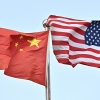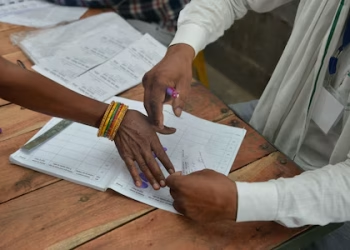President Donald Trump speaks in the Oval Office of the White House, Friday, Oct. 10, 2025, in Washington, as Virginia Gov. Glenn Youngkin, Centers for Medicare and Medicaid Services Administrator Dr. Mehmet Oz and Health and Human Services Secretary Robert F. Kennedy Jr. listen.
Alex Brandon/AP
hide caption
toggle caption
Alex Brandon/AP
WASHINGTON — President Donald Trump threatened Friday to impose an additional 100% tax on Chinese imports starting on or before Nov. 1, potentially pushing tariff rates near the levels that stoked fears of a global recession in April.

The president expressed frustration with China’s new export controls on rare earth elements – and said on social media that “there seems to be no reason” to meet with Chinese leader Xi Jinping as part of an upcoming trip to South Korea.
Trump later told reporters that he had not canceled his meeting. “But I don’t know if we’ll get there,” he said during an appearance in the Oval Office on another topic. “I’ll be there anyway, so I guess we could have it.”
Trump also suggested it might be time to ease his new tariff threat. “We’re going to have to see what happens. That’s why I did it on November 1,” he said.
New Chinese restrictions
The Chinese government on Thursday restricted access to rare earth minerals, requiring foreign companies to obtain special permission to ship the metal elements abroad. He also announced licensing requirements for exports of technologies used in the mining, smelting and recycling of rare earths, adding that any request to export products used in military goods would be rejected.
On social media, Trump called the export controls “shocking” and “unexpected.” He said China was “becoming very hostile” and holding the world “captive” by restricting access to metals and magnets used in electronics, computer chips, lasers, jet engines and other technologies.
Trump said in a message that “beginning November 1, 2025 (or earlier, depending on any other actions or changes taken by China), the United States of America will impose a 100% tariff on China, in addition to any tariff it currently pays.” The president also said the US government would respond to China by imposing its own export controls “on all critical software” from US companies.
The Chinese Embassy in Washington did not immediately respond to a request for comment from The Associated Press.
Trump is known for using threats as a tactic
The S&P 500 fell 2.7% on concerns about growing tensions between the world’s largest economies. It was the market’s worst day since April, when the president last mentioned such high import taxes. However, the stock market closed before the president explained the terms of his threat.
Not only could the global trade war started by Trump be reignited, but import taxes on top of the 30% already levied on Chinese goods could, based on past statements by the administration, cause a breakdown in trade between the United States and China in a way that could lead to a collapse in global growth.

Even though Trump’s wording was definitive, he is also known to have backed away from his threats. Earlier this year, some investors began engaging in what the Financial Times called “TACO” trading, which stands for “Trump Always Chickens Out.”
The prospect of tariffs of such magnitude could heighten the president’s own political concerns, potentially pushing up inflation at a time when the job market appears fragile and the consequences of a government shutdown are beginning to deepen with layoffs of federal workers.
The United States and China are vying for advantage in trade negotiations, after import taxes announced earlier this year sparked the trade war. The two countries agreed to reduce tariffs after negotiations in Switzerland and the United Kingdom, but tensions remain as China continues to restrict U.S. access to hard-to-mine rare earths needed for a wide range of U.S. technologies.
There is already a backlog in export license applications following Beijing’s previous round of export controls on rare earth elements, and the latest announcements “add even more complexity to the global supply chain for rare earth elements”, the European Union Chamber of Commerce in China said in a statement.
There are other flashpoints in trade relations, including U.S. restrictions on China’s ability to import advanced computer chips, sales of U.S.-grown soybeans and a series of port fees imposed by both countries starting Tuesday.
Analysts say it’s time to deescalate
Trump did not formally cancel the meeting with Xi, but simply indicated that it might not take place as part of a trip later this month to Asia. The trip was to include a stopover in Malaysia, which is hosting the Association of Southeast Asian Nations summit; a stopover in Japan; and a visit to South Korea, where he was to meet Xi before the Asia-Pacific Economic Cooperation summit.
Sun Yun, director of the China program at the Stimson Center, said Beijing’s move was a reaction to U.S. sanctions on Chinese companies this week and upcoming port taxes targeting China-linked ships — but said there was room for de-escalation to keep the leaders’ meeting alive. “It’s a disproportionate reaction,” Sun said. “Beijing believes that de-escalation will also have to be mutual. There is room for maneuver, particularly with regard to implementation.”
Gracelin Baskaran, director of the Critical Minerals Security Program at the Center for Strategic and International Studies in Washington, D.C., said China holds leverage because it dominates the rare earth market with 70% of the mining and 93% of the production of permanent magnets made from them, which are crucial for high-tech products and the military.
“These restrictions undermine our ability to grow our industrial base at a time when we need it. Second, it is a powerful negotiating tool,” she said.
Craig Singleton, senior director of the China program at the Foundation for Defense of Democracies, a think tank, said Trump’s message could “mark the beginning of the end of the tariff truce” that had lowered tax rates applied by both countries.
“A mutually assured breakup between the two parties is no longer a metaphor,” Singleton said. “Both sides are reaching for their economic weapons at the same time, and neither seems willing to back down.”








